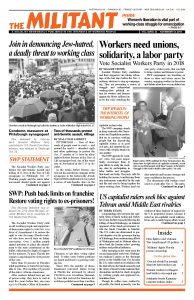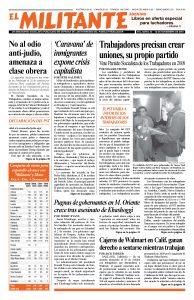November 15, 1993
In response to the 24 killings in the past two weeks all working people should demand that the British troops get out of Ireland now. The occupation forces are engaged in a dirty war to defend the interests of the capitalists of London, Dublin and Belfast. As part of that war they arm and give intelligence to the rightist street gangs of the Ulster Defence Association. The Royal Ulster Constabulary cops are the greatest source of violence.
The big-business press in Britain describes the carnage in the streets of working-class neighborhoods of Northern Ireland as “tribal warfare.” The implication is that the British government is needed to “civilize” the unruly natives. But the escalating murders of the last months are neither “tribal” nor an ancient religious conflict. What’s involved are modern social classes struggling to defend their interests.
November 15, 1968
[President] Johnson’s decision to halt the bombing of North Vietnam and to include the South Vietnamese National Liberation Front in the Paris negotiations was an election-eve gimmick to swing votes behind Hustling Hubert [Humphrey], an attempt to placate mounting antiwar sentiment.
Now is no time for people in the antiwar movement to think that their job is over. It is clear that Washington will continue to attempt to impose its will on the people of Vietnam both on the battlefield and at the conference table. Washington has no business being in Vietnam and the only way to real peace is to withdraw U.S. forces immediately.
Antiwar activists must intensify their efforts to reach GIs and to build an ever more massive and powerful movement that can finally force the warmakers in Washington to bring the GIs home, alive and immediately.
November 13, 1943
The miners have won! The miners have breached the Little Steel formula. They have repulsed the autocratic and arbitrary pretensions of the War Labor Board that no settlement would be approved while a strike is in progress. The miners have proven again that a determined militant fight is worth more than all the resolutions. The agreement that the United Mine Workers signed is virtually the same as the last Illinois contract, previously rejected by the WLB.
Early in struggle, Roosevelt personally assumed the generalship in the fight to housebreak the miners’ union. He used against them the vast resources of the capitalist state, and of his own virtually unlimited war-time powers. He threatened the miners with troops, with the draft, with jail. But the miners remained undismayed and they continued to hold their ground.

